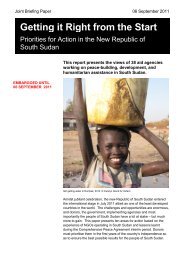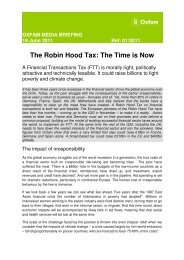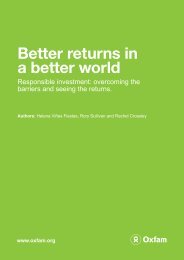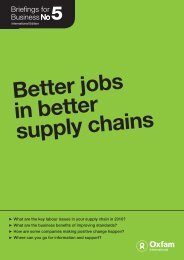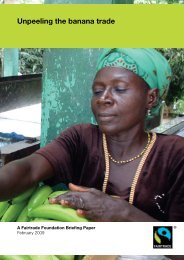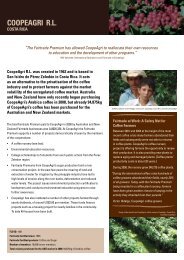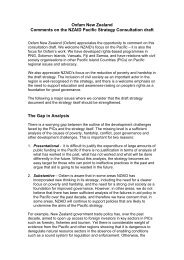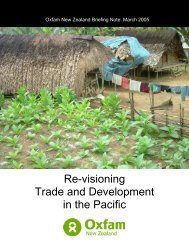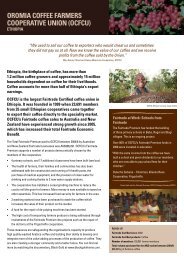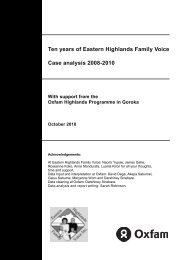Growing a Better Future - Oxfam International
Growing a Better Future - Oxfam International
Growing a Better Future - Oxfam International
- No tags were found...
You also want an ePaper? Increase the reach of your titles
YUMPU automatically turns print PDFs into web optimized ePapers that Google loves.
A new prosperityThis future is not certain. Crisis on the scale we areexperiencing today almost always leads to change: theGreat Depression and the Second World War led to anew world order, the United Nations, the Bretton Woodssystem, and the spread of welfare states. The oil andeconomic crises of the 1970s replaced Keynesianismwith laissez-faire economics and the WashingtonConsensus.The challenge before us today is to seize the opportunityfor change and set course towards a new prosperity, anage of co-operation rather than competition, in which thewell-being of the many is put before the interests of thefew. During the last food price crisis, politicians tinkeredat the margins of global governance. This time they mustdeal with the root causes. Three big shifts are needed:• First, we must build a new global governance to avertfood crises. Governments’ top priority must be to tacklehunger and reduce vulnerability – creating jobs andinvesting in climate adaptation, disaster risk reduction,and social protection. <strong>International</strong> governance – oftrade, food aid, financial markets, and climate finance– must be transformed to reduce the risks of futureshocks and respond more effectively when they occur.• Second, we must build a new agricultural future byprioritising the needs of small-scale food producersin developing countries – where the major gains inproductivity, sustainable intensification, povertyreduction and resilience can be achieved.Governments and businesses must adopt policiesand practices that guarantee farmers’ access to naturalresources, technology and markets. And we mustreverse the current gross misallocation of resourceswhich sees the vast majority of public money foragriculture flow to agro-industrial farms in the North.• Finally, we must build the architecture of a newecological future, mobilizing investment and shiftingthe behaviours of businesses and consumers, whilecrafting global agreements for the equitable distributionof scarce resources. A global deal on climate changewill be the litmus test of success.All of this will require overcoming the vested intereststhat stand to lose out. There is growing appetite to do soas these issues rise up the political agenda, pushed byevents and by campaigners, or grasped by leaders witha sense of moral purpose. Though the banks fight reformtooth and nail, public outrage has seen legislativemeasures passed in the USA, and steps towardregulation in the UK and elsewhere. And a financialtransactions tax is on the agenda in the EU and at theG20, alongside measures to rein in commodityspeculation and reform agricultural trade. Thoughspecial interests continue to pervert food aid in manyrich countries, a concerted public campaign in Canadasucceeded in freeing it to work effectively; Canada nowleads international negotiations to achieve the sameoutcome globally. Though agricultural subsidies remainenormous, some reform has reduced their negativeimpacts in developing countries. Though dirty industrycontinues to block progress on climate change,responsible companies have broken ranks with them. 7A growing number of countries are adopting boldgreenhouse gas reduction targets or making ambitiousinvestments in clean technologies. Global investments inrenewable technologies overtook fossil fuel spending forthe first time in 2009. 8But what is needed is a step change. Strong politicalleaders with unambiguous mandates from their peoples.Progressive businesses that choose to break ranks withlaggards and blockers. Customers that demand they doso. And it is needed now. The window of opportunity maybe short-lived, and many of the choices that must betaken are already upon us: if catastrophic climate changeis to be avoided, global emissions must peak within thenext four years; 9 if we are to avoid a spiralling foodprice crisis, fragility in the global system must beaddressed today.‘We need to address the question of globalhunger not as one of production only, butalso as one of marginalization, deepeninginequalities, and social injustice. We livein a world in which we produce more foodthan ever before, and in which the hungryhave never been as many.’Olivier de Schutter, Special Rapporteur onthe Right to Food at the FAO Conference,November 200908Opposite: Women from Dola village construct a pond toirrigate their vegetable gardens. Nepal’s hill districts havelacked investment in agriculture and are faced with a risein food prices and reduced crop yields as a result ofclimate change. (Nepal 2010)



